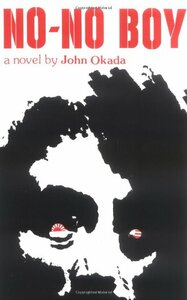Take a photo of a barcode or cover
No-No Boy was hard to find, but amazingly, I encountered a hard copy at BookOff in San Diego a few years back. The cover – not to judge the book by it – put me off as a bit unnerving, and the subject matter was a little off-putting as well. That is, the book is about a man who answered "no" to the two questions posed by the U.S. government of Japanese-American men at the time of WWII: do you renounce Japan, and will you fight for America?
This book was written by a Japanese-American man who did in fact fight for America in WWII, so I find his portrayal of Ichiro, the protagonist, surprisingly realistic and thoughtful. In general, this book is for people who know something of the history of Japanese-Americans during that period, and some references may be lost on other readers.
I found it hard to get through the first half of the book, for all the run-on paragraphs and sentences which, stylistically, were not my preference. However, after a while, Okada begins to address real and heavy topics like loyalty, guilt, and discrimination. Despite the fact that my grandfather served in the 100th Battalion 442nd Infantry Battalion of the U.S. Army, and didn't experience the same backlash for being Japanese as Ichiro does in the book, the discrimination that is portrayed is highly realistic and accurate from what I understand.
My grandfather said that, even as a highly decorated, returned veteran, he experienced racism and discrimination, so it wasn't just the no-no boys. In any case, Okada paints a bleak picture of a man struggling to find his identity and place in a country that hates him blindly. This book was thought-provoking and moving for me, as a yonsei (fourth-generation) Japanese-American, and I recommend it.
This book was written by a Japanese-American man who did in fact fight for America in WWII, so I find his portrayal of Ichiro, the protagonist, surprisingly realistic and thoughtful. In general, this book is for people who know something of the history of Japanese-Americans during that period, and some references may be lost on other readers.
I found it hard to get through the first half of the book, for all the run-on paragraphs and sentences which, stylistically, were not my preference. However, after a while, Okada begins to address real and heavy topics like loyalty, guilt, and discrimination. Despite the fact that my grandfather served in the 100th Battalion 442nd Infantry Battalion of the U.S. Army, and didn't experience the same backlash for being Japanese as Ichiro does in the book, the discrimination that is portrayed is highly realistic and accurate from what I understand.
My grandfather said that, even as a highly decorated, returned veteran, he experienced racism and discrimination, so it wasn't just the no-no boys. In any case, Okada paints a bleak picture of a man struggling to find his identity and place in a country that hates him blindly. This book was thought-provoking and moving for me, as a yonsei (fourth-generation) Japanese-American, and I recommend it.
dark
emotional
medium-paced
challenging
dark
It was shocking to me how modern the book felt. It acutely captures the sense of alienation, anger and frustration felt by many Asian Americans. I learned about Japanese internment camps in history class in high school, but of course that did not capture the insanity of stripping Americans of their rights. Nor did it even mention the impossible decision that was forced on Japanese Americans-- fight for a country that won't even acknowledge you as a citizen.
I highly recommend this book to anyone. It is definitely a must read of American literature.
I highly recommend this book to anyone. It is definitely a must read of American literature.
I don't think I've ever read as complex or conflicted of a portrayal of post-WII Japanese-American identity. After the internment camps and the war, some Japanese-Americans sought quick and quiet assimilation, while others rejected America and isolate themselves within their Japanese community. Ichiro, however, represents—sometimes a little too bluntly—the little recognized in-between: the shattered, self-loathing confusion of those who identify as neither Japanese or American but were required to make an illogical choice. Unfortunately, the other characters were one-note metaphors, and the women in particular became reductive, sexist tropes: Freud's wet dream of a hysterical mom who must be destroyed for independence, and the abandoned, lonely women who just wants to be loved but otherwise does nothing. The prose ranged from flowery to rambling and irritating. It's undoubtedly an important novel but most of the narrative lacked the nuance it gave to Ichiro's identity struggles.
challenging
emotional
medium-paced
Plot or Character Driven:
Character
Loveable characters:
Yes
Diverse cast of characters:
Yes
Flaws of characters a main focus:
Complicated
As Frank Chin wrote in the afterword, “John, I read your book. I like it a lot.” What I liked about No-No Boy is how engaging and nuanced Okada writes about the Japanese American experience, exploring the psychological impact of internment through Ichiro’s thoughts about the implications of his decisions and interactions with the people in his life. The ruminations about Asian American identity, especially the in-between of not feeling Japanese or American enough, still ring true.
This is flat out a masterpiece of American literature. It's super short too - highly recommended read.





